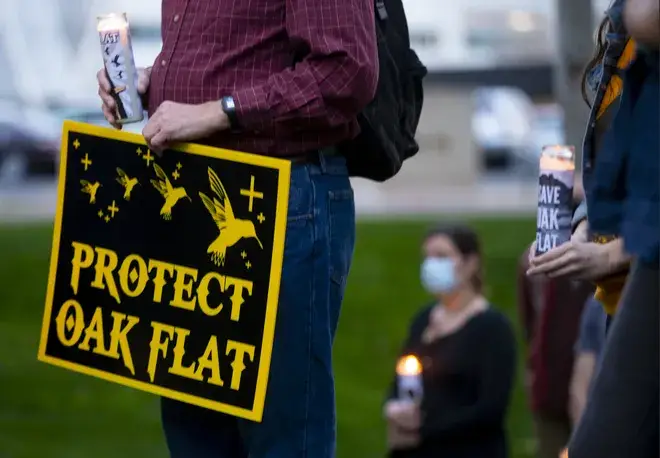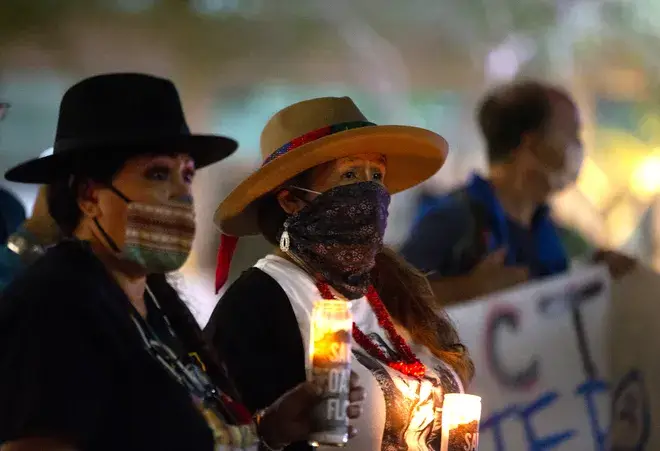US Supreme Court turns down Oak Flat copper mine case for a 2nd time
Debra Utacia Krol Arizona Republic as posted Oct. 6th, 2025 on USA Today found at : https://www.usatoday.com/story/news/local/arizona-environment/2025/10/06/oak-flat-supreme-court-case/86550954007/
Images and text copyright USA Today / Arizona Republic
Key Points
- Grassroots group Apache Stronghold had asked the Supreme Court to halt a land transfer that will allow construction of a huge copper mine at Oak Flat east of Phoenix.
- Justices refused to hear the case for the second time, issuing a terse statement on the first day of their new term. They had turned down an appeal earlier this year.
- The land exchange between the U.S. Forest Service and Resolution Copper has been the object of a long legal battle and was temporarily blocked by a court in August.
The U.S. Supreme Court has declined for a second time to hear a bid by Apache Stronghold to overturn a land exchange that would allow a huge copper mine at Oak Flat, a site 60 miles east of Phoenix held as sacred by Indigenous peoples.
The high court issued a terse statement Oct. 6, the first day of its new term. Apache Stronghold, a grassroots group, is trying to halt the deal between the U.S. Forest Service and British-Australian mining firm Resolution Copper at Oak Flat, a deal that has been the object of a prolonged legal battle.
Resolution wants to build a huge copper mine on the 2,200-acre site, which they say would bring hundreds of jobs and billions of dollars to Arizona's economy. Oak Flat is also a site held sacred by Apache peoples, one of Arizona's remaining riparian zones and a popular recreation area.
Justice Neil Gorsuch, who issued a blistering dissent after the Supreme Court first declined to hear Apache Stronghold's appeal in May, simply said that he would have granted Apache Stronghold's plea. Justice Samuel Alito recused himself from discussions.
Apache Stronghold issued a statement saying in part that the fight is not over.
"Oak Flat deserves the same respect and protection this country has long given to other places of worship," the group said.
Three other cases await hearings at the 9th U.S. Circuit Court of Appeals, including the newest from a group of Apache women, who seek to wield a recent Supreme Court decision affirming the rights of parents to instruct their children in their religious beliefs.
The legal fight over Oak Flat
Oak Flat Campground, known by the Apache names Chi’chil Biłdagoteel, "the place where the Emory oak grows," has been ground zero in a battle over Native religious rights on public lands as well as preservation of one of Arizona's most scarce commodities, a wetland.
The 2,200-acre primitive campground and riparian zone, within the Tonto National Forest about 60 miles east of Phoenix, also lies over one of the nation's largest remaining bodies of copper ore.
Tribes, environmentalists and their allies have been fighting for nearly two decades to stop the government from handing over Oak Flat to Resolution Copper in exchange for other environmentally sensitive lands in Arizona.
To obtain the copper ore, Resolution, which is owned by multinational companies Rio Tinto and BHP, will use a method known as block cave mining in which tunnels are drilled beneath the ore body, and then collapsed, leaving the ore to be moved to a crushing facility. Eventually, the ground will subside, leaving behind a crater about 1,000 feet deep and nearly 2 miles across, obliterating Oak Flat and its religious and environmental significance.
The company says the mine would inject about $1 billion annually into Arizona's economy over its lifespan and create thousands of jobs in Arizona's Copper Triangle, where mining has been a part of the economy for more than 100 years.
Resolution had pursued the land exchange with the Forest Service for about 10 years before it became attached as a last-minute rider to a defense bill by lawmakers led by the late Sen. John McCain in December 2014. The annual appropriations for the nation's defense infrastructure are known as "must-pass" bills, and are virtually veto-proof.
The Oak Flat mine has been tied up in the courts for years. The first lawsuit was filed by Apache Stronghold in January 2021 in federal court to stop the land swap, citing religious rights guarantees under the First Amendment and the Religious Freedom Restoration Act.
The Becket Fund for Religious Liberty, a religious freedom nonprofit law firm, agreed to join attorneys Michael Nixon and Clifford Levinson and a group of law professors to represent Apache Stronghold, which includes Apache and other Native peoples and their allies.
Two other suits filed in January 2021 by the San Carlos Apache Tribe and a coalition of environmentalists and tribes were held pending the filing of a new EIS after the Biden administration rescinded the environmental impact statement in March 2021 for further consultation with tribes. The Forest Service announced consultation was concluded in 2023. Resolution was granted permission to join the lawsuit in 2023.
In 2024, the 9th U.S. Circuit Court of Appeals ruled against Apache Stronghold in a narrow 6-5 decision. That fall, the group appealed to the U.S. Supreme Court.
The Forest Service's announcement in April that the process would move forward again set off a flurry of court filings to stop or at least put on hold the move, which would open up a 60-day period when the land exchange could take place. Apache Stronghold won a temporary halt to the proceedings until the high court either decided not to take the case or issued a decision.
The Supreme Court turned Apache Stronghold down in May.
A series of legal challenges worked through the courts trying to halt the land exchange, but days before the land swap was expected to move ahead, a federal judge in Phoenix rejected the latest arguments in two separate cases, including the newest lawsuit.
On June 9, U.S. District Court Judge Dominic W. Lanza barred the Forest Service from completing the land exchange until a full 60 days after the new document was issued to give parties from the other two lawsuits sufficient time to review the environmental impact statement and revive their litigation.
In June, Apache Stronghold asked the high court to reconsider its decision and agree to hear the case. They amended their request in July.
In August, Lanza heard the San Carlos and environmentalists' lawsuits Aug. 6. He turned down their requests to halt the land exchange Aug. 15.
Plaintiffs in the cases immediately appealed the decision to the 9th U.S. Circuit Court, which issued the temporary restraining order. The court gave all parties a deadline of Oct. 14 for response and answer documents to be rendered to the court and said it would hear the case in January 2026.







